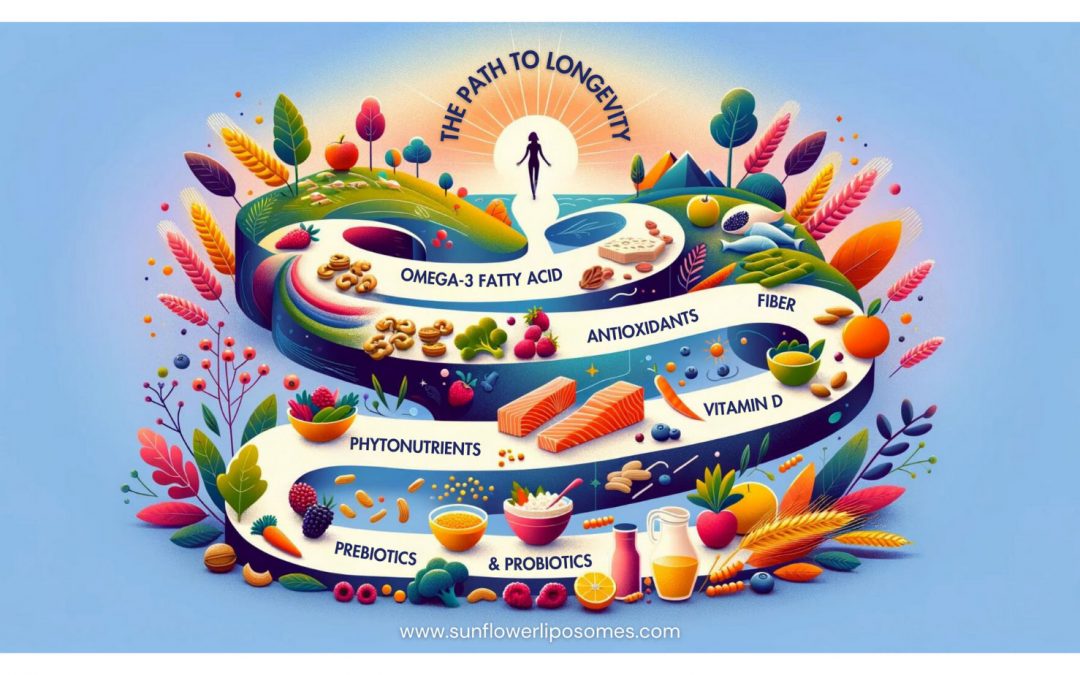“Let food be thy medicine and medicine be thy food.”
Hippocrates
Let’s face it: we all want to stay healthy and live longer, slowing down the aging process along the way. While it’s not possible to stop aging altogether, we can certainly strive to age gracefully and live healthier, longer lives. And guess what? What we put on our plate plays a significant role in this journey.
From supporting cognitive function and cardiovascular health to boosting overall well-being, a well-balanced diet may just be the ultimate longevity hack.
So, let’s dive into the top 9 nutrients for longevity and overall health.
1. Omega-3 Fatty Acids:
Omega-3 fatty acids are like superheroes for your body, linked to lower risk of cardiovascular diseases and cognitive decline, and shown to improve brain health, renowned for their anti-inflammatory properties and heart-healthy benefits.
Found abundantly in fatty fish like salmon, mackerel, anchovies, and sardines, shellfish, as well as in flax seeds, chia seeds, and walnuts, and alo egg yolks. Incorporating omega-3s into your diet is a delicious way to support longevity.
2. Antioxidants:
Colorful fruits and vegetables like berries, spinach, kale, broccoli, carrots, sweet potatoes, avocados. bell peppers, asparagus, nuts, seeds, cacao, and green tea are loaded with antioxidants, making them essential for promoting longevity and vitality.
3. Fiber:
Don’t underestimate the power of fiber in your quest for longevity. Not only does it keep your digestive system happy and healthy, but it also helps regulate blood sugar levels and cholesterol, reducing your risk of heart disease and promoting overall longevity.
Whole grains, legumes, fruits, and vegetables like fresh berries, avocado, apples, broccoli, artichokes, chickpeas, lentils, quinoa and chia seeds are all excellent sources of fiber.
4. Vitamin D:
Often referred to as the “sunshine vitamin,” Vitamin D is crucial for maintaining strong bones, supporting immune function, mood support and reducing the risk of chronic diseases.
Boosting your vitamin D levels primarily involves getting more sunlight exposure, consuming vitamin D-rich foods, and, if necessary, considering supplements.
Here’s a comprehensive guide on how to do so:
- Sunlight Exposure: spend daily time in the sunshine
- Dietary Sources: increase your intake of fatty fish, these include fatty fish like salmon, mackerel, and tuna. Include fortified foods such as fortified milk, orange juice, cereals, and yogurt. Eating eggs, especially the yolks, are also a good source of vitamin D. Consider adding vitamin D supplements if you have limited sun exposure or dietary restrictions. Incorporate more mushrooms such as maitake and shiitake into your diet
- Regular Testing: get your vitamin D levels tested regularly, especially if you have risk factors such as limited sun exposure, darker skin, obesity, or certain medical conditions.
5. Vitamin C
As previously mentioned, vitamin C stands out as a potent anti-aging antioxidant renowned for its ability to enhance longevity and overall well-being. Its remarkable benefits warrant special recognition!
Vitamin C is widely acknowledged for its pivotal role in bolstering immune function. By fortifying the body’s defenses, it helps defend the body against illnesses, infections, and diseases, thereby fostering both short-term vitality and long-term health resilience. Moreover, vitamin C‘s significance extends to promoting longevity, notably through its involvement in collagen synthesis and skin health. Because vitamin C is water soluble and doesn’t remain in the body for extended periods, it requires more frequent intake. Opting for the liposomal form enhances absorption at the cellular level and prolongs its presence in the body, maximizing its effectiveness.
Foods rich in vitamin C include: citrus fruits like oranges, grapefruits, lemons, and limes; berries like strawberries, blueberries, raspberries; leafy greens like spinach, kale, swiss chard; broccoli, kiwi, pineapple, tomatoes,bell peppers and brussels sprouts
6. Plant-Based Phytonutrients:
Phytonutrients are natural compounds found in plant foods that boast a myriad of health benefits, from reducing inflammation to protecting against chronic diseases. Load up on a colorful array of fruits, vegetables, herbs, and spices to harness the power of these potent plant-based nutrients.
7. Magnesium
Are you aware that magnesium plays a role in more than 300 enzymatic reactions within the body? It’s crucial for maintaining bone health, regulating blood pressure, and even lowering the risk of type 2 diabetes. Given its involvement in numerous essential functions, magnesium stands out as a top-notch nutrient for promoting longevity and overall well-being!
Magnesium rich foods include: dark leafy greens like spinach and kale, almonds, pumpkin seeds, dark chocolate, avocado, cashews, salmon, edamame, quinoa.
8. Zinc
Zinc is undeniably crucial for both health and longevity due to its involvement in numerous vital functions within the body.
Here’s why it’s so essential, along with a list of foods rich in zinc:
- Immune Function: Zinc is involved in the development and function of immune cells, helping the body fight off infections and illnesses.
- Cell Growth and Repair: Zinc is necessary for cellular growth, division, and repair processes. It is involved in DNA synthesis, cell proliferation, and tissue repair, making it indispensable for maintaining healthy tissues and organs throughout life.
- Inflammatory Response: Zinc helps regulate the body’s inflammatory response. It acts as a modulator, balancing the immune system’s pro-inflammatory and anti-inflammatory signals. Proper zinc levels contribute to a healthy inflammatory response, which is essential for preventing chronic inflammation and associated diseases.
- Wound Healing: Zinc plays a vital role in wound healing processes. It is involved in collagen synthesis, tissue remodeling, and immune function at the site of injury. Adequate zinc levels promote faster healing and reduce the risk of complications from wounds and injuries.
- Sense of Taste and Smell: Zinc is necessary for maintaining a healthy sense of taste and smell. Zinc deficiency can lead to alterations in taste and smell perception.
Foods Rich in Zinc: shellfish like Oysters, crab, lobster, and shrimp; meat like beef, pork, lamb, and poultry; legumes like beans, lentils, chickpeas, and peas; nuts and seeds like pumpkin seeds, hemp seeds, sesame seeds, and cashews; dairy products like milk, cheese, and yogurt; whole grains like whole grains like wheat, rice, quinoa, and oats.
9. Prebiotics and Probiotics:
A thriving gut microbiome is essential for a robust immune system. Prebiotics, found in foods like garlic, onions, bananas, leeks, apples, dandelion greens, asparagus, chicory, chickpeas, jerusalem artichokes and oats, serve as fuel for beneficial gut bacteria.
Meanwhile, probiotics, found in fermented foods such as yogurt, kefir, kimchi, tempeh, kombucha, miso and sauerkraut, introduce beneficial live microorganisms into the gut, further supporting immune function.
Incorporating these nutrient-rich foods into your diet can help fortify your body’s natural defenses and promote overall well-being. However, it’s essential to remember that no single food or nutrient can provide complete immunity. Instead, focus on cultivating a diverse and balanced diet, rich in whole, unprocessed foods, to nourish your body and support optimal immune function. Additionally, consult with a healthcare professional or registered dietitian to tailor dietary recommendations to your individual needs and health goals.
Ola Porebska
Nutrition & Health Coach


Recent Comments